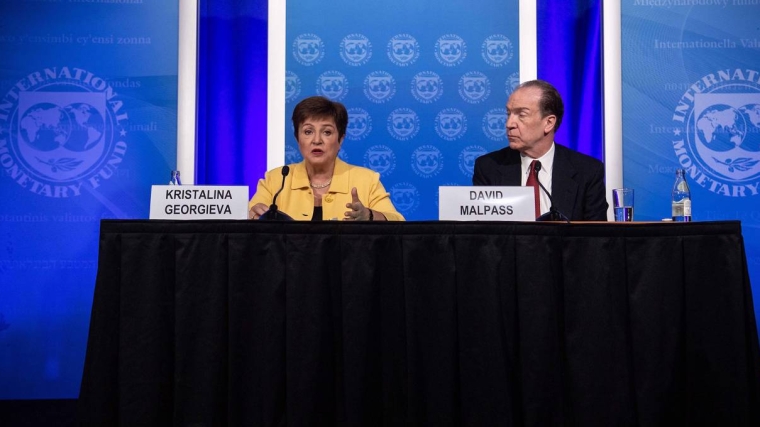
By Gordon Brown and Larry Summers
The nations of the developed world have responded to the COVID-19 crisis by supporting their domestic economies and financial systems in bold and unprecedented ways, on a scale that would have been unimaginable three months ago.
In contrast, when the world’s finance and central bank governors convene virtually this week for the semi-annual International Monetary Fund-World Bank meetings, steps will be taken to fortify the international system. But nothing comparable to what countries are doing domestically.
Historians such as Charles Kindleberger have argued convincingly that it was a failure of international cooperation that made the depression of the 1930s “Great.” And even when there has been coordinated action in response to the crises that have occurred since, more often than not it has been taken after a huge human cost.
The Bretton Woods conference on reconstructing the international financial system came after the devastation of a world war. The Brady Plan for resolving the Latin American debt crisis was agreed to only after the region suffered a lost decade.
The 2009 London G20 meeting on the global financial crisis, however, demonstrated the value of early and coordinated action to limit the damage to the global economy, maintain trade, and support fragile emerging markets.
The next wave of the COVID-19 crisis will occur in the developing world. Around 900,000 are likely to die in Asia, and a further 300,000 in Africa, according to grim, but perhaps cautious, estimates from Imperial College London.
While social distancing is the West’s route to suppression of the virus, the developing world’s crowded cities and often overcrowded slums make isolation difficult. Advice on hand-washing means little where there is no access to running water. Without a basic social safety net, choices are narrow and stark: go to work and risk disease, or stay home and starve with your family.
But if the disease is not contained in these places, it will come back – in second, third, and fourth waves – to haunt every part of the world.
Pervasive economic and financial failure in emerging markets also threatens the viability of the supply chains on which all countries depend. Given its magnitude, emerging-market debt threatens the stability of a global financial system that is already dependent on strong central bank support. And with emerging markets accounting for more than half of global GDP, global growth is threatened as well.
Just as the US Federal Reserve and other major central banks have expanded their balance sheets in previously unimaginable ways, the international community needs this week to do, in former European Central Bank President Mario Draghi’s famous phrase, “whatever it takes” to maintain a functioning global financial system. At a time when the United States is borrowing an extra $2 trillion to meet its needs, it would be tragic if massive austerity was forced on an already-stressed developing world.
First, the IMF, the World Bank, and regional development banks need to be as aggressive as the world’s central banks in expanding their lending. This means recognizing both that the current near-zero interest-rate environment makes it possible to use more leverage than previously, and that there is little point in having reserves if they cannot be utilized now.
The World Bank nearly tripled its lending in 2009. An even more ambitious target may be appropriate now, along with a major increase in subsidized lending at a time when low borrowing rates in rich countries make it much less costly. In addition to relieving debt interest payments, the IMF, with its $150 billion in gold reserves and network of credit lines with central banks, should be prepared to lend up to $1 trillion.
Second, if ever there was a moment to expand the use of the international currency known as Special Drawing Rights (the IMF’s global reserve asset), it is now. If global money is to stay in balance with the domestic monetary expansion in rich countries, an increase in SDRs of well over $1 trillion is urgently needed.
Third, it would be a tragedy and a travesty if stepped-up global financial support for developing countries ended up helping those countries’ creditors rather than their citizens. National debts incurred before the crisis must be at the top of the international financial agenda. We should agree now that once we have clarity on the economic fallout of the crisis, we will pursue the kind of systemic approach required to restore debt sustainability in a number of emerging-market and developing countries, while safeguarding their prospects for attracting new investment.
But the most immediate and largest short-term support can come from waiving upcoming debt payments by the 76 low- and lower-middle-income countries that are supported by the International Development Association.
The current proposal is that creditor countries would offer a six- or nine-month standstill on bilateral debt repayment, at a cost of $9-13 billion. But this proposal is constricted both in its time frame and the range of creditors included.
We propose relieving over $35 billion due to official bilateral creditors over this year and next, because the crisis will not be resolved in six months and governments need to be able to plan their spending with some certainty.
Here the role of China, which holds over a quarter of this bilateral debt, will be crucial. China’s decision to be a long-term provider of funds for investment in developing economies has been welcome, and its spending has speeded the development of important infrastructure. Now is the time for China to play a leadership role with other creditors by waiving its debt repayments this year and next.
Nearly 20 years ago, when we both argued the case for debt relief for nearly 40 highly indebted poor countries, almost all the debt was owed to official bilateral or multilateral creditors and little to the private sector. Now, $20 billion – often borrowed at high interest rates – is due by the end of 2021 to private-sector creditors.
As recognized by the Institute for International Finance, which represents private-sector creditors to emerging markets, the private sector has to take its share of the pain. It would be unconscionable if all the money flowing from our multilateral institutions to help the poorest countries was used not for health care or anti-poverty measures, but simply for paying private creditors, especially those like the large American banks that are continuing to pay dividends at a time of crisis. The ministers and governors convening this week should join their authority with that of the IMF and the World Bank to mobilize the private sector around a voluntary plan for addressing these debts.
Just as the pandemic can be contained most effectively and least expensively with bold early measures, the lesson from the past is that international recessions and their consequent human costs are best addressed quickly and boldly. We must act fast and act together.
Gordon Brown is a former Prime Minister (2007-2010) and Chancellor of the Exchequer (1997-2007) of the United Kingdom. Lawrence H. Summers was US Secretary of the Treasury (1999-2001), Director of the US National Economic Council (2009-2010), and President of Harvard University (2001-2006), where he is currently University Professor. Copyright: Project Syndicate, April 2020, published here with permission.
6 Comments
I have little respect for either author and judging by the title thought they may have been suggesting waiving debts and thus rewarding the more profligate developing countries. There are too many desperately poor countries with fortunes held in Swiss bank accounts by corrupt leaders and ex-leaders. However they recommend a simple moratorium for debt repayments over the next 9 months, it does make sense and should be supported by all developed nations.
One of the small pleasures of this Covid-19 epidemic is having the 3rd world elites being treated by their own health systems not in expensive foreign private hospitals.
Yes, interesting the pedigree of the two authors. Wouldn't trust either of them not to be acting in some way in their own best interests.
According to Helen Clark, it should be the top brass at the UN coordinating and convening whatever the global response to the economic crisis that we are heading in to should be - but the UN haven't even got so far as a Security Council meeting to declare this economic crisis as a threat to world peace and security;
"So a standing capacity, which would be the Secretary-General, the heads of the International Monetary Fund and the World Bank and the Director-General of the WHO.
"Their networks are huge - the IMF and World Bank - they have the ears of every finance minister in the world.
"And what's going to release money now for a response that will fight the health aspects of the virus, and the economic crisis and social crisis, is the finance ministers."
Clark said another action the UN could make would be for the Secretary-General to go the Security Council to formally state the pandemic was a threat to global peace and security, and ask it to make a resolution to that effect.
"Security Council resolutions are binding. If it says that, as it did with Ebola six years ago, and calls on all member states to use all necessary means to fight it, that really ups the ante for global coordination."
https://www.rnz.co.nz/national/programmes/checkpoint/audio/2018742769/t…
Presumably Helen has used her lockdown time to work on a stand-up routine :)
Interesting read;
https://thediplomat.com/2020/04/did-xi-jinping-deliberately-sicken-the-…
Interesting indeed. Did the Chinese and our own govt and many other govts downplay it because they were dumb or looking after themselves or was it genuine fear of panic? Panic is a legitimate fear for govts - shouting fire in a crowded theatre being the classic example - but what do you do if you are in a theatre and smell burning?? Surely when in the mists of time this epidemic is forgotten the video of Australians fighting over toilet rolls will linger (I thank God they were not Kiwis).
My U3A course on Byzantium history mentioned an empress who blinded her own son to get him out of the way - it was a highly sophisticated but autocratic society that produced many remarkably evil leaders. Hard to believe China is different; they tried to hide its melamine contanimation of milk. Anyone who would permit babies to be painfully poisoned in order to save face are the lowest of the low. The memorable quote from a brave Chinese father was "May they die a thousand deaths".
Judging by the number of comments the topic of how we look after those less fortunate than ourselves is not interesting. I'm guessing it is worse now we are pre-occupied with our own troubles: covid-19, house prices, resilience of our economy, savings, investments, etc. If so that is sad because unlike previous 3rd world economic problems this pandemic is not their fault nor could it have been anticpated.

We welcome your comments below. If you are not already registered, please register to comment
Remember we welcome robust, respectful and insightful debate. We don't welcome abusive or defamatory comments and will de-register those repeatedly making such comments. Our current comment policy is here.